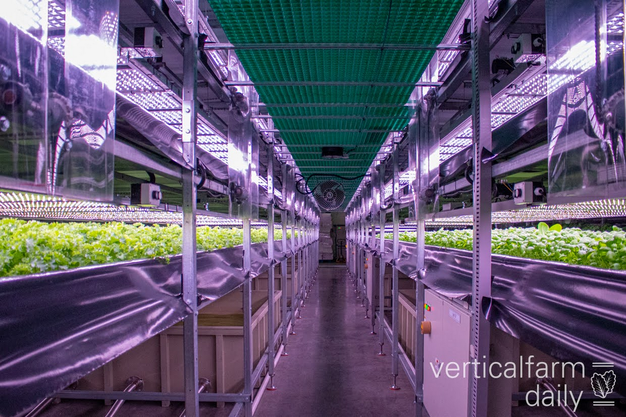"We take a holistic view of sustainability, delivering infrastructure solutions to some of the biggest environmental and social challenges we face; vertical farming is one of them," he explains. "As MD of the Sustainable Infrastructure division at Gresham House, I oversee a team that is scaling innovative real asset platforms. Our investment principle is that impact drives returns, meaning each of our platforms addresses a key sustainability challenge – from habitat banks delivering biodiversity net gain to vertical farms transforming our food system," says Peter Bachmann, managing director of sustainable infrastructure at Gresham House, an £8.5bn specialist sustainable asset manager with offices in the UK, Ireland, and Australia.
Many of the characteristics of vertical farming make it a perfect space for Peter and Gresham House to leverage their sustainability credentials. Peter highlights vertical farming's ability to utilize renewable energy sources to provide extra support for long-term sustainability goals.
 "Vertical farming has proven it can offer meaningful solutions to some of the agricultural industries' biggest obstacles," he points out. "Think of labor shortages, overuse of land, the damage caused by pesticides, and water use challenges." He goes on to comment, "Vertical farming is up to 1,900 times better from a carbon perspective than long-haul imported field-grown crops, but yet at the same price!"
"Vertical farming has proven it can offer meaningful solutions to some of the agricultural industries' biggest obstacles," he points out. "Think of labor shortages, overuse of land, the damage caused by pesticides, and water use challenges." He goes on to comment, "Vertical farming is up to 1,900 times better from a carbon perspective than long-haul imported field-grown crops, but yet at the same price!"
Vertical farming businesses must now deliver on those promises. "It's vital that we continue to strive to raise people's awareness of the environmental and health benefits that indoor agriculture can provide by using substantially less of our finite resources in controlled environments."
Energy costs will decrease
However, Peter also acknowledges the main pain points of the vertical farming space, namely energy. "Energy accounts for up to 40% of the input costs of a vertical farming operation," he says. "That said, this is a challenge that can be quickly overcome with renewable energy, which is becoming much cheaper each year. Solar power, in particular, has seen a dramatic reduction in price over the years. Combining that trend with the advancements we're seeing in vertical farming technology bodes well for the industry in terms of both competitiveness and sustainability."
Increasing shelf life
Of course, there's more to vertical farming than just energy and resource efficiency. "The shelf life of produce from 'traditional' farms is simply no match for vertically farmed produce," he says. "We had some rocket from Fischer Farms at the office that was still edible after 5 months, for example."
"Vertical farming has the potential to transform the food waste landscape – that's a huge step forward from an environmental and social sustainability point of view."
That's one of the main reasons why supermarket chains and retailers are showing growing interest in vertical farm-grown produce. "Supermarkets want products that are cost-effective with predictable expiry dates, and our products offer that. Its impact on food security and environmental benefits is also gathering more attention from the industry." After all, vertical farming can consistently produce the same quality and quantity of greens at a given time, allowing retailers to better plan their stock takes and pricing merchandising. This consistency offers mutual benefit in the food market.
"Growers appreciate price stability, which is one of the biggest issues for food producers at the moment. But if retailers can offer fixed-price contracts, then you reduce the volatility of prices and eliminate a lot of the uncertainty we're seeing in markets at the moment."

Local is a key benefit
Despite the current challenges, Peter looks at the future of vertical farming with hope – at least in the UK and the EU. "Consumers are increasingly realising the superiority of locally sourced food," he remarks. "The vertical farming space has the potential to address the ever-present challenges in delivering secure, affordable, and environmentally friendly food. To deliver this, we need to continue to innovate and collaborate across the sector to realize its potential and ultimately transform our food system for the better."
"Here at Gresham House, we are hugely excited by verta ical farming andthatworking to enable this nascent industry to deliver positive impact which drives strong financial returns for our investors."
 For more information:
For more information:
Gresham House
Peter Bachmann, Managing Director of Sustainable Infrastructure
p.bachmann@greshamhouse.com
https://greshamhouse.com/row/real-assets/sustainable-infrastructure-investment/
